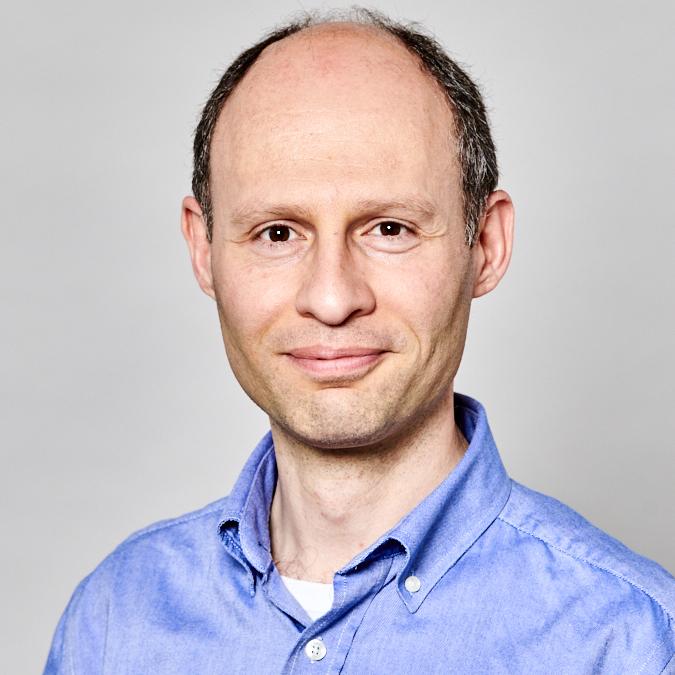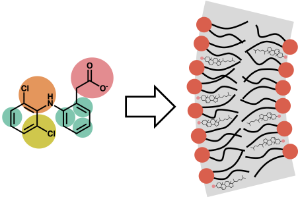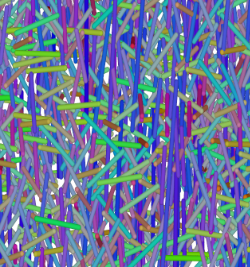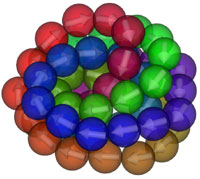Staff profile
Dr Mark Miller
Associate Professor

| Affiliation | Telephone |
|---|---|
| Associate Professor in the Department of Chemistry | +44 (0) 191 33 42037 |
Biography
Mark Miller read Natural Sciences at the University of Cambridge, and continued there to study for a Ph.D. on the energy landscapes and dynamics of model clusters under the supervision of Prof. David Wales. Mark then undertook postdoctoral work in the group of Prof. William Reinhardt at the University of Washington in Seattle, and in the group of Prof. Daan Frenkel at the Institute for Atomic and Molecular Physics (AMOLF) in Amsterdam. Mark returned to Cambridge initially as a Junior Research Fellow at Churchill College, then as an EPSRC Advanced Research Fellow and finally as a University Lecturer.
In 2013, Mark moved to the Department of Chemistry at Durham University. He is the Chair of the Board of Examiners in Chemistry (2022-2025) and has served as President of the Senior Common Room of one of the Colleges, St Cuthbert's Society from 2015 to 2024.
Research Interests
My research employs specially designed simulation techniques to investigate the structure, dynamics and thermodynamics of molecular and colloidal systems. A key element in my approach is the use of coarse-grained models that provide insight into a problem by being as simple as possible while retaining the essential chemistry and physics. Even with simplified models, it is often highly challenging to bridge the gap between the length- and time-scales associated with individual particles and those associated with collective properties. The development of simulation methodology is essential to make progress in such cases.
Coarse-grained mapping and parametrisation

We are working on automated methods for producing coarse-grained mappings and parametrisations of organic molecules, especially for use with the Martini force field. We are motivated by the need for quantitative prediction of membrane-water partitioning coefficients for safety assessments. Simulation of faithful coarse-grained models would open up the possibility of high-throughput computational screening of compounds. We are working with industry and regulatory partners to tackle an ever-broader chemical space. The most recent version of our coarse-graining script is available on GitHub.
Percolation and network-forming fluids

The characteristics of disordered phases can often be described by the nature of the aggregates that they contain. Aggregates may be compact or diffuse and may grow large enough to percolate (i.e., to span the entire system). Our work on percolation covers dense and open gel networks, mixtures of highly elongated particles (like carbon nanotubes), systems exposed to external fields, and non-equilibrium states of active matter (self-propelled particles).
Clusters and energy landscapes

Small aggregates of molecules or colloidal particles often have properties that differ from the bulk (very large samples). As well as being important in their own right, such finite systems can also be a useful forum for investigating how the interactions between particles lead to their self-assembly and collective behaviour. I have worked on many sorts of clusters, especially using the theory of potential energy landscapes and disconnectivity graphs. The picture shows a knotted cluster of dipolar particles whose unusual structure arises from the competition between compactness and the tendency to form chains.
Selected Publications
- Re-entrant percolation in active Brownian hard disks; D. Evans, J. Martín-Roca, C Valeriani and M. A. Miller; Soft Matter 20 7484 (2024)
- Partitioning into phosphatidylcoline-cholesterol membranes: liposome measurements, coarse-grained simulations, and implications for bioaccumulation; T. D. Potter, N. Haywood, A. Teixeira, G. Hodges, E. L. Barrett and M. A. Miller; Environ. Sci.: Processes Impacts 25 1082 (2023)
- Automated coarse-grained mapping algorithm for the Martini force field and benchmarks for membrane-water partitioning; T. D. Potter, E. L. Barrett and M. A. Miller; J. Chem. Theor. Comput. 17 5777 (2021)
- Control of superselectivity by crowding in three-dimensional hosts; A. T. R. Christy, H. Kusumaatmaja and M. A. Miller; Phys. Rev. Lett. 126 038002 (2021)
- Phase transitions on non-uniformly curved surfaces: coupling between phase and location; J. O. Law, J. M. Dean, M. A. Miller and H. Kusumaatmaja; Soft Matter 16 8069 (2020)
- Controlling fragment competition on pathways to addressable self-assembly; J. Madge, D. Bourne and M. A. Miller; J. Phys. Chem. B 122 9815 (2018)
- Knot theory in modern chemistry; K. E. Horner, M. A. Miller, J. W. Steed and P. M. Sutcliffe; Chem. Soc. Rev. 45 6432 (2016)
Research interests
- Soft condensed matter
- Atomic and molecular clusters
- Percolation
- Coarse-grained modelling
- Biomolecular condensates
- Self assembly
- Simulation methodology
Publications
Chapter in book
- Colloidal Clusters on Curved SurfacesMiller, M., Law, J., Gerrand, A., & Kusumaatmaja, H. (2022). Colloidal Clusters on Curved Surfaces. In D. Wales (Ed.), Energy Landscapes of Nanoscale Systems. (pp. 129-150). Elsevier. https://doi.org/10.1016/b978-0-12-824406-7.00014-2
Journal Article
- Energy Landscapes of Model Knotted PolymersHao, T., Ge, Y., Miller, M. A., L N Francesco, A., Wales, D. J., L. N. Francesco, A., & Wales, D. J. (2025). Energy Landscapes of Model Knotted Polymers. Journal of Chemical Theory and Computation, 21(16), 8168-8181. https://doi.org/10.1021/acs.jctc.5c01005
- Predicting aquatic toxicity of anionic hydrocarbon and perfluorinated surfactants using membrane-water partition coefficients from coarse-grained simulationsGredelj, A., Roberts, J., Kearney, E. M., Barrett, E. L., Haywood, N., Sheffield, D., Hodges, G., & Miller, M. A. (2025). Predicting aquatic toxicity of anionic hydrocarbon and perfluorinated surfactants using membrane-water partition coefficients from coarse-grained simulations. Environmental Science: Processes & Impacts, 27(4), 1131-1144. https://doi.org/10.1039/d4em00649f
- Numerical methods for unraveling inter-particle potentials in colloidal suspensions: A comparative study for two-dimensional suspensionsRees-Zimmerman, C. R., Martín-Roca, J., Evans, D., Miller, M. A., Aarts, D. G. A. L., & Valeriani, C. (2025). Numerical methods for unraveling inter-particle potentials in colloidal suspensions: A comparative study for two-dimensional suspensions. The Journal of Chemical Physics, 162(7), Article 074103. https://doi.org/10.1063/5.0246890
- Re-entrant percolation in active Brownian hard disksEvans, D., Martín-Roca, J., Harmer, N. J., Valeriani, C., & Miller, M. A. (2024). Re-entrant percolation in active Brownian hard disks. Soft Matter, 20(37), 7484-7492. https://doi.org/10.1039/d4sm00975d
- Partitioning into phosphatidylcholine-cholesterol membranes: liposome measurements, coarse-grained simulations, and implications for bioaccumulationPotter, T. D., Haywood, N., Teixeira, A., Hodges, G., Barrett, E. L., & Miller, M. A. (2023). Partitioning into phosphatidylcholine-cholesterol membranes: liposome measurements, coarse-grained simulations, and implications for bioaccumulation. Environmental Science: Processes and Impacts, 25(6), 1082-1093. https://doi.org/10.1039/d3em00081h
- Automated Coarse-Grained Mapping Algorithm for the Martini Force Field and Benchmarks for Membrane–Water PartitioningPotter, T. D., Barrett, E. L., & Miller, M. A. (2021). Automated Coarse-Grained Mapping Algorithm for the Martini Force Field and Benchmarks for Membrane–Water Partitioning. Journal of Chemical Theory and Computation, 17(9), 5777-5791. https://doi.org/10.1021/acs.jctc.1c00322
- Nearest-neighbor connectedness theory: A general approach to continuum percolationCoupette, F., de Bruijn, R., Bult, P., Finner, S., Miller, M. A., van der Schoot, P., & Schilling, T. (2021). Nearest-neighbor connectedness theory: A general approach to continuum percolation. Physical Review E, 103(4), Article 042115. https://doi.org/10.1103/physreve.103.042115
- Control of Superselectivity by Crowding in Three-Dimensional HostsChristy, A. T., Kusumaatmaja, H., & Miller, M. A. (2021). Control of Superselectivity by Crowding in Three-Dimensional Hosts. Physical Review Letters, 126(2), Article 028002. https://doi.org/10.1103/physrevlett.126.028002
- Phase transitions on non-uniformly curved surfaces: Coupling between phase and locationLaw, J. O., Dean, J. M., Miller, M. A., & Kusumaatmaja, H. (2020). Phase transitions on non-uniformly curved surfaces: Coupling between phase and location. Soft Matter, 16(34), 8069-8077. https://doi.org/10.1039/d0sm00652a
- Controlling Fragment Competition on Pathways to Addressable Self-AssemblyMadge, J., Bourne, D., & Miller, M. A. (2018). Controlling Fragment Competition on Pathways to Addressable Self-Assembly. Journal of Physical Chemistry B (Soft Condensed Matter and Biophysical Chemistry), 122(42), 9815-9825. https://doi.org/10.1021/acs.jpcb.8b08096
- Nucleation on a sphere: the roles of curvature, confinement and ensembleLaw, J. O., Wong, A. G., Kusumaatmaja, H., & Miller, M. A. (2018). Nucleation on a sphere: the roles of curvature, confinement and ensemble. Molecular Physics, 116(21-22), 3008-3019. https://doi.org/10.1080/00268976.2018.1483041
- Continuum percolation of polydisperse rods in quadrupole fields: Theory and simulationsFinner, S. P., Kotsev, M. I., Miller, M. A., & van der Schoot, P. (2018). Continuum percolation of polydisperse rods in quadrupole fields: Theory and simulations. Journal of Chemical Physics, 148(3), Article 034903. https://doi.org/10.1063/1.5010979
- Optimising Minimal Building Blocks for Addressable Self-AssemblyMadge, J., & Miller, M. A. (2017). Optimising Minimal Building Blocks for Addressable Self-Assembly. Soft Matter, 13(42), 7780-7792. https://doi.org/10.1039/c7sm01646h
- Knot theory in modern chemistryHorner, K. E., Miller, M. A., Steed, J. W., & Sutcliffe, P. M. (2016). Knot theory in modern chemistry. Chemical Society Reviews, 45(23), 6432-6448. https://doi.org/10.1039/c6cs00448b
- Quantification of Stereochemical Communication in Metal–Organic AssembliesCastilla, A., Miller, M., Nitschke, J., & Smulders, M. (2016). Quantification of Stereochemical Communication in Metal–Organic Assemblies. Angewandte Chemie International Edition, 55(36), 10616-10620. https://doi.org/10.1002/anie.201602968
- Knots in soft condensed matterColuzza, I., Jackson, S. E., Micheletti, C., & Miller, M. A. (2015). Knots in soft condensed matter. Journal of Physics: Condensed Matter, 27(35), Article 350301. https://doi.org/10.1088/0953-8984/27/35/350301
- Percolation in suspensions of hard nanoparticles: From spheres to needlesSchilling, T., Miller, M. A., & van der Schoot, P. (2015). Percolation in suspensions of hard nanoparticles: From spheres to needles. Europhysics Letters, 111(5), Article 56004. https://doi.org/10.1209/0295-5075/111/56004
- Dynamics and thermodynamics of decay in charged clustersMiller, M. A., Bonhommeau, D. A., Moerland, C. P., Gray, S. J., & Gaigeot, M. (2015). Dynamics and thermodynamics of decay in charged clusters. Molecular Physics, 113(17-18), 2428-2434. https://doi.org/10.1080/00268976.2015.1037805
- Design strategies for self-assembly of discrete targetsMadge, J., & Miller, M. A. (2015). Design strategies for self-assembly of discrete targets. Journal of Chemical Physics, 143(4), Article 044905. https://doi.org/10.1063/1.4927671

